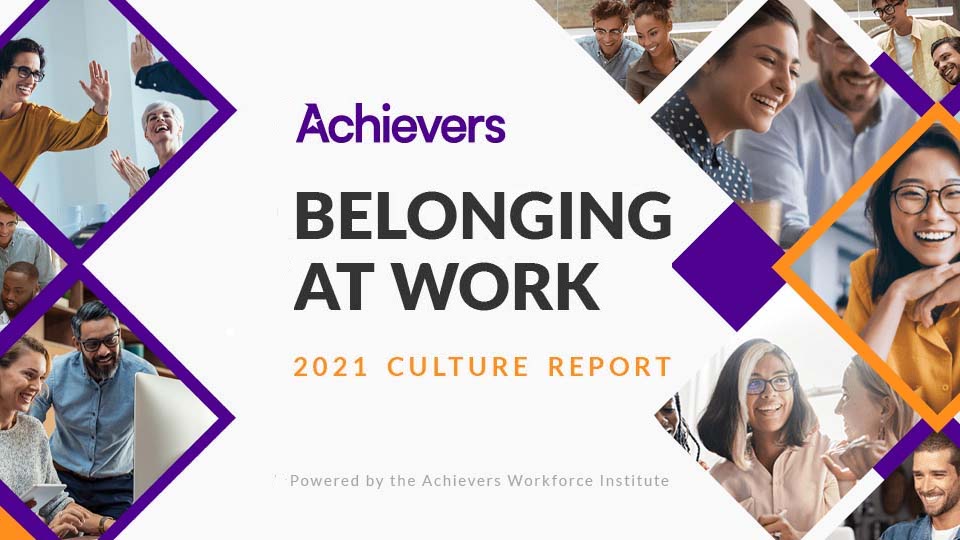
Thank you! A team member will reach out shortly.
There’s no doubt that today’s workforce is rapidly changing, as millennial and Gen Z employees continue to transform the modern workplace. This new, multi-generational labor pool has ushered in a new set of expectations that employers can’t afford to ignore. Companies across industries are to take a long, hard look at how they approach complex topics, including diversity, equity, and inclusion.
A company’s commitment to diversity initiatives — as a crucial part of their overall employee engagement strategy — can make an enormous impact in terms of employee motivation, performance, trust, and overall profitability. Let’s take a closer look at what diversity, equity, and inclusion really means in the workplace, including tips on how to accelerate implementation of these key concepts at your own company.
What is diversity, equity, and inclusion?
Diversity, equity, and inclusion (DEI) is the combination of three related, important concepts that encourage a discrimination-free environment of participation and belonging. Much more than just a trendy buzzword, DEI and the efforts it has spurred in the workplace have completely transformed how today’s employees feel about employers. Without it, organizations lack the ability to develop an environment where each team member feels like they belong and is motivated to contribute as much as they can every day.
What is diversity?
No two people are the same, and the commitment to celebrate and accept this reality is a vital part of fostering a diverse workplace. In the context of DEI, diversity means ensuring your workforce includes individuals with a broad range of perspectives, backgrounds, and experiences. The more diverse your workforce, the better, as highly-diverse teams are 87% better at making swift, impactful decisions.
There’s a huge spectrum when it comes to defining all the factors relevant to diversity. That being said, your company should consider the following aspects when working to embrace different types of employees:
- Generational diversity
- Cognitive diversity
- Disability
- Political diversity
- Gender diversity
- Race diversity
- Religious diversity
- Socioeconomic diversity
- Cultural diversity
What is equity?
Another core tenet of DEI, equity is the concept of ensuring justice and fairness of access to opportunities. This means enabling every individual employee to succeed by supporting their unique circumstances, needs, and requirements. Because certain individuals have been historically impacted by specific disadvantages, equity aims to correct those unfair obstacles by providing employees with everything they need to flourish.
Equity in the workplace involves several fundamental principles:
- Inclusive practices
- Equal opportunities
- Transparent communication
- Education and awareness
- Accountability
While many businesses believe they’ve made notable strides in creating an equitable workplace, research shows that only 28% of employees feel their organization is fair to everyone. This staggering discrepancy demonstrates a clear need for a more purposeful approach to equity.
What is inclusion?
Like diversity, inclusion focuses on ensuring each individual is welcomed and comfortable in their workplace. But the idea of inclusion itself takes this one step further, requiring organizations to proactively develop, reexamine, and tweak their environments to better empower every employee to contribute and engage. Comprehensive workplace inclusion should encompass key aspects of the workplace experience, including leadership, recruitment, and communication practices.
Promoting authenticity and a strong sense of belonging inspire employees to do their best. It’s no wonder organizations who prioritize inclusivity experience a 56% increase in performance and a 37% decrease in absenteeism.
Why is DEI important?
In a time where 51% of employees are open to leaving their current organization — most often due to poor engagement and a negative workplace culture (41%) — businesses must find reliable ways to boost retention or risk losing top talent to their competitors. As companies that see sustained growth are 72% more likely to have high levels of workforce diversity and a whopping 76% of millennials say they’d leave an employer if DEI initiatives weren’t offered, putting in the work to improve your organization’s approach to diversity, equity, and inclusion is a no-brainer.
In fact, when properly developed and maintained, each of the three concepts that make up an effective DEI practice can help your organization reap some truly substantial benefits.
Recruiting
When focusing on diversity and inclusivity, your recruiting team will naturally need to turn their attention to a larger talent pool. This wide range of candidates will bring with it some novel ideas, perspectives, experiences, and expertise — all of which can positively impact the ways your business operates and grows. Not to mention that successfully launching, maintaining, and sharing your DEI initiatives can improve your company’s employer brand. A full 76% of job seekers say that a diverse workforce is an important factor when evaluating potential employers, so getting DEI right can really help your team better attract top talent.
Retention
Once those candidates have made it through the door and transitioned to fully-functioning employees, your organization needs to keep them there. Investing in a healthy work environment that bolsters employee wellbeing can make all the difference. And you simply can’t develop a healthy, fair workplace without devoting time and resources to DEI. Genuine efforts to drive diversity, equity, and inclusion leads to positive changes that help motivate employees to stick around for the long haul.
Business performance
Companies with diverse employees enjoy up to a 20% higher rate of innovation and 19% higher innovation-related revenue. Effective DEI emboldens employees with different perspectives to share their unique ideas, learn from one another, and collaborate in a more productive manner. As your business inevitably evolves, grows, and experiences periods of uncertainty, the empathy and creativity that come from a diverse team and inclusive environment can help mitigate potential hardships. In fact, diverse companies continue to earn 2.5 times higher cash flow per employee despite facing unavoidable growing pains.
Company culture
A strong company culture is a lasting competitive advantage. Ninety-four percent of employees believe a healthy workplace culture is imperative to the business’s success. Prioritizing DEI from recruitment on promotes a sustainable culture where everyone feels like they belong. Transparent communication, accountability, and addressing and resolving discriminatory behavior — all of which are vital components of an effective DEI program — result in a positive company culture that both attracts and retains top talent, along with an improved bottom line.
How to practice DEI in the workplace
Whether you’re just getting started or looking to amplify your existing DEI efforts, getting it right can seem daunting. But by examining some key areas of your workforce operations and making purposeful adjustments, your organization can take its DEI program to the next level.
Start by reflecting on your company’s hiring practices, which should set a precedent for how your company and its employees approach diversity. As you examine your current recruitment process, ask your team the following:
- Where do we source our candidates?
- What questions do we ask in the interview process?
- Which criteria do we use to evaluate candidates?
- Are the criteria we use fair and unbiased?
Once you’ve gathered key details around your existing hiring practices and made any necessary adjustments, find practical ways to inject DEI into the daily lives of those hired employees. For example, you can create employee resource groups or networks to help individuals better connect in a safe space. These encourage employees to get involved, share their perspectives, and make the cultural changes they want to see at your organization.
On top of providing employees with shared interests, backgrounds, and identities the opportunity to express themselves, employee resource groups also offer leadership clear insights into the needs and desires of different groups within the workforce. By analyzing these insights and using them to make further changes to your DEI program – ideally with the help of a voice of the employee solution – you can create a feedback loop that positively impacts your company culture and employee engagement.
Next, you’ll want to make sure you tee up your management to treat all employees equitably, including when it comes to giving praise. Although 79% of employees say they would be more loyal to their employers if they received more recognition, many organizations ignore this vital piece of the DEI puzzle in favor of other, less impactful strategies. But by showing that you value your employees for exactly who they are and what they bring to the table, you can cultivate a more equitable workplace.
Recognition and rewards programs — backed by powerful tools — help employees better identify and call out their direct reports and peers for everyday wins and major accomplishments alike. They can also be used to promote DEI initiatives by allowing employees to tie recognition to specific company values. And since 92% of employees agree that when they’re recognized for a specific action, they’re more likely to take that action again in the future, investing in a strong recognition and rewards program can really spark improved productivity among your workforce.
Finally, you’ll want to nurture inclusivity in your organization by collecting employee feedback and acting on those insights to improve the overall culture. Employee engagement platforms, which help managers gather feedback in real time, make it easier to take action in a swift, meaningful way and course-correct before things get too off track. Use surveys and other feedback channels to ask specific questions related to inclusion, and then put that feedback into action to show employees their voices matter.
Get results from your diversity, equity, and inclusion efforts with Achievers
As your organization builds or tweaks its DEI program, it’s important to remember that these initiatives aren’t simply boxes that need checking. Rather, they’re crucial steps in the right direction as organizations seek to right the wrongs of historic and systemic injustices, as well as both qualitative and quantitative ways to improve engagement and culture.
To take some of the guesswork out of the DEI equation, Achievers offers an intelligent employee experience platform that ensures all team members are heard and empowered to succeed. With tools to help support employee recognition across your company, reward your workforce for working on DEI initiatives, and provide every team member with a real voice, Achievers can help take your organization’s DEI program to the next level.
Learn how a great employee experience that’s grounded in strong DEI values can give your organization a lasting competitive advantage with a free demo of the Achievers Employee Experience Platform.

In this article:










